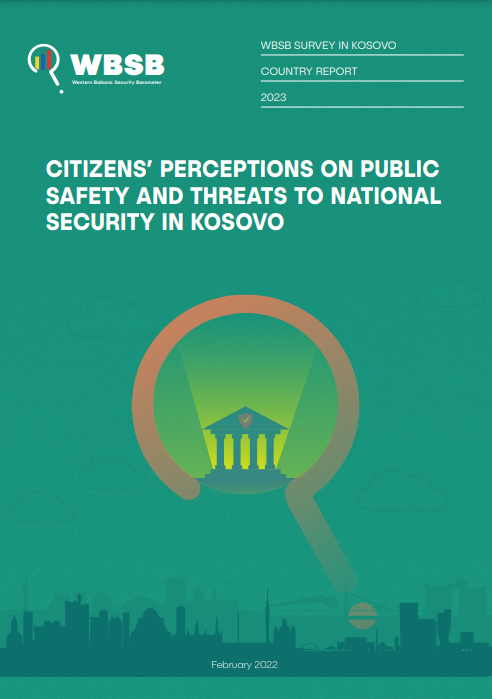28/02/2023

Kosovar Centre for Security Studies (KCSS)
NED
Dea Fetiu, Dorjeta Rukiqi
The following Western Balkans Security Barometer (WBSB) report provides a thorough analysis of respondents’ perception of potential threats to their public safety and national security in Kosovo in 2022. Respondents feel generally safe in their close communities. Nevertheless, the sense of safety gradually decreases as the communities grow larger. Around 77 percent of the respondents declared that they feel safe in their houses, while they feel the least safe in their country (around 33 percent). Respondents’ perceptions between 2021 and 2022 indicate a slow decrease in their feeling of public safety; whereby in the previous 2021 WBSB, 79 percent and 40 percent of respondents stated that they feel safe in their homes and in their country, respectively. On the other hand, almost half of the respondents feel safe on the cyberspace. Brain drain is ranked as the highest threat to public safety, with 83 percent of the respondents viewing it as a threat or high threat to their respective communities. Stray animals and drug abuse are also perceived as highly threatening phenomena. Moreover, respondents are generally concerned about shortages of necessities, however, they express the biggest concerns about the shortages of electricity. On the national level, respondents see the increased prices of goods as the highest threat towards Kosovo’s national security, followed closely by the energy crisis. Pollution and climate change, violent extremism, and COVID-19 are seen as the lowest threats to national security. When asked if COVID-19 continues to endanger public health, almost half of the respondents answered negatively. Further, COVID-19 was ranked as the lowest threat to Kosovo’s national security. Opinions are somewhat divided when it comes to the efficiency of the COVID-19 vaccine on hindering the pandemic; yet 45 percent of respondents believe that the vaccine contributed to curb the pandemic. According to the survey data, the main causes of domestic violence in Kosovo are poor economic conditions and low levels of education. Respondents believe that raising the quality of education, and organizing more raising awareness campaigns are some of the measures that need to be taken by institutions to prevent and fight domestic violence.
The data presented in the report derive from the Western Balkans Security Barometer (WBSB) survey. WBSB is a new regional initiative launched by KCSS in 2020, implemented in cooperation with the Belgrade Centre for Security Policy (BCSP) in Serbia and Center for the Study of Democracy and Governance (CSDG) in Albania, supported by the National Endowment for Democracy (NED). WBSB serves as an instrument to measure public perceptions in Albania, Kosovo and Serbia on different security-related issues. The findings demonstrate how citizens percept or are informed about the issues presented in this report. As such, the views presented in this report do not necessarily represent the views of the KCSS, BCSP, CSDG or NED.